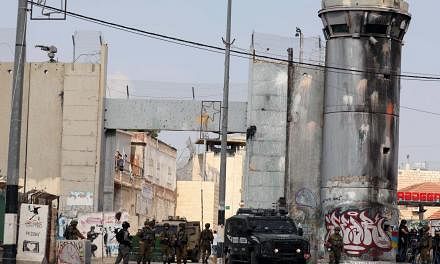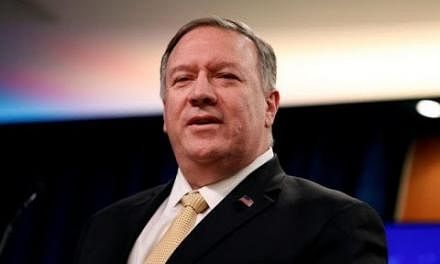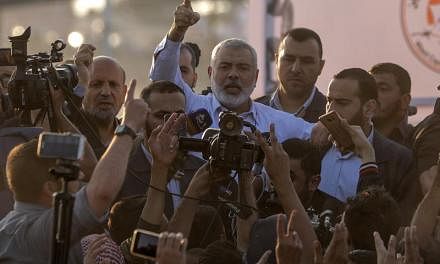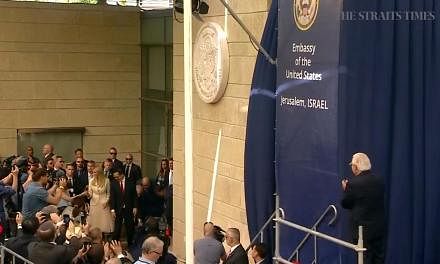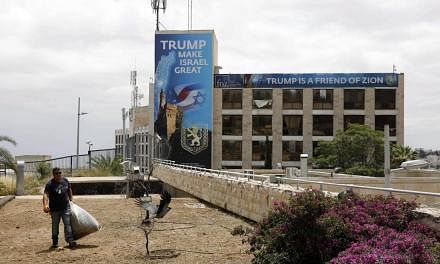JERUSALEM • The decision by United States President Donald Trump to recognise Jerusalem as the capital of Israel would upend decades of US policy.
Underpinning the move is a proposed shift of the US Embassy in Israel from Tel Aviv to Jerusalem.
Mr Trump was expected to sign a national security waiver - as have his predecessors - keeping the embassy in Tel Aviv for another six months, but would commit to expediting a move. Here are some questions and answers on the issue:
WHAT IS THE DISPUTE?
The tensions over Jerusalem have their origins decades ago. After the end of World War II in 1947, the United Nations approved a partition plan that provided for two states - one Jewish, one Arab - with Jerusalem governed by a "special international regime" owing to its unique status.
The Arabs rejected the partition plan, and a day after Israel proclaimed its independence in 1948, the Arab countries attacked the new state. They were defeated. Amid violence by militias and mobs on both sides, huge numbers of Jews and Arabs were displaced.
Jerusalem was divided: The western half became part of the new state of Israel (and its capital, under an Israeli law passed in 1950), while the eastern half, including the Old City, was occupied by Jordan.
Subsequently, Israel seized control of East Jerusalem from Jordan during a 1967 war, and later annexed it. The move was never recognised by the international community, but Israel declared the city its undivided capital. The Palestinians see East Jerusalem as the capital of their future state.
No country accepted Israeli sovereignty and almost all had their embassies in the commercial capital Tel Aviv instead. Jerusalem is home to holy sites sacred to Muslims, Christians and Jews, such as the Dome of the Rock, the Western Wall, the Temple Mount and the Church of the Holy Sepulchre.
WHY IS THE DECLARATION SUCH A BIG DEAL?
The final status of Jerusalem has been one of the most vexatious questions in the Israel-Palestine conflict. Mr Trump's declaration of Jerusalem as Israel's capital will be seen as deciding an issue that was supposed to be left to negotiations, breaking with the international consensus.
WHAT IS THE WAIVER?
In 1995, the US Congress passed the Jerusalem Embassy Act, calling on the country to move its embassy to the holy city.
"Since 1950, the city of Jerusalem has been the capital of the state of Israel," it said, demanding that the government move the embassy.
The Act is binding, but there was a clause that presidents could delay it for six months at a time to protect "national security interests" through a so-called waiver.
Presidents Bill Clinton, George W. Bush and Barack Obama signed these waivers every six months.
Mr Trump reluctantly signed the first waiver that came due during his presidency on June 1. The second deadline lapsed on Monday.
WHAT HAPPENS IF HE DOES NOT SIGN?
If Mr Trump chooses not to sign the waiver, the embassy would not move immediately, but there are rapid repercussions. Under the 1995 Act, the US State Department would see a 50 per cent cut in all its future budgets for "acquisition and maintenance of buildings abroad" until the new embassy opens.
WHAT WOULD BE THE IMPACT OF THE MOVE?
Mr Alan Baker, a former Israeli ambassador to Canada, said recognition of Jerusalem as Israel's capital without moving the embassy would amount to a "sort of legal acrobatics - trying to please both sides and not annoy either".
But Mr Baker said "anything is better than now, where Jerusalem is not recognised by Israel's best friend and supporter". Moving the embassy would be seen as cementing Israel's hold over the city.
Palestinians see the issue starkly differently. Mr Saeb Erekat, secretary-general of the Palestine Liberation Organisation, said on Sunday that such recognition would "promote international anarchy and disrespect for global institutions and law".
WHAT ABOUT OTHER COUNTRIES?
Before 1980, several countries had their embassies in Jerusalem, including the Netherlands and Costa Rica. However, when Israel passed a law in July of that year declaring Jerusalem as its united capital, a UN Security Council resolution condemned Israel's annexation of East Jerusalem and declared it a violation of international law. In 2006, Costa Rica and El Salvador became the last countries to move their embassies out of Jerusalem.
AGENCE FRANCE-PRESSE, NYTIMES

